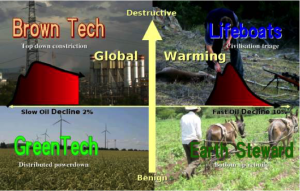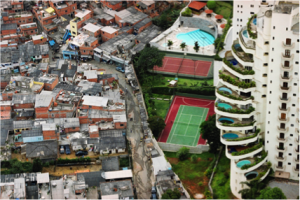David Holmgren, a permaculturalist and ecologist, identifies four major possibilities the world face in light of the twin giants of peak oil and anthropogenic climate change. He plots these possibilities with respect to the rate of fossil fuel collapse and the speed at which climate change will effect the climate.
The brown tech scenario describes a slow oil descent coupled with fast and destructive climate change. In this scenario, Holmgren predicts the wealth gap widening, with elites continuing to live lavish lifestyles and separating themselves from the worst effects of climate change while continuing to pollute the world with industry and burning the remainder of the carbon fuels left.
On the other hand, if climate change occurs rather slowly and green tech solutions are utilized, it is possible that the globe can find ways to scale down energy use and making it more available to all people. This paradigm depends on popular movements to pressure governments and elites to invest in so called “green energy” technology which will reduce consumption of fossil fuels and allow for a slower descent to a more sustainable global energy diet.
 If oil shortages increase dramatically and simultaneously with accelerated and destructive climate change events, Holmgren posits a “lifeboats†scenario, in which much of civilization collapses and bands of humans across the globe find ways to survive extreme weather and resultant food insecurity exacerbated by weather events. Global transportation will grind to a halt, and current dependence on fossil fuels for food production will cause a food crisis. Those with the skills of hunting and horticultural food production will survive, and while violence will increase with the lack of goods, communities that learn to live with each other and in relationship to their landscape will become analogous to monastic communities in Dark Age Europe which kept arts and writing alive through a turbulent period.
If oil shortages increase dramatically and simultaneously with accelerated and destructive climate change events, Holmgren posits a “lifeboats†scenario, in which much of civilization collapses and bands of humans across the globe find ways to survive extreme weather and resultant food insecurity exacerbated by weather events. Global transportation will grind to a halt, and current dependence on fossil fuels for food production will cause a food crisis. Those with the skills of hunting and horticultural food production will survive, and while violence will increase with the lack of goods, communities that learn to live with each other and in relationship to their landscape will become analogous to monastic communities in Dark Age Europe which kept arts and writing alive through a turbulent period.
Finally, if climate change is slow, coupled with quick oil decline, Holmgren envisions an Earth Steward paradigm, in which civilizational catastrophe does not occur, but rather across the globe the people with skills in resilient and sustainable living will teach methods to the broader populace, and humanity will return to a subsistence lifestyle. Permaculture and indigenous methods of living with the landscape will be the norm, and humanity will scale down rapidly but without as much bloodshed and chaos as envisioned in the Lifeboats scenario.
In reality, these scenarios are already playing out across the globe simultaneously. Already, what Holmgren calls “brown” is happening. Elites in the global  south live in resource-rich gated communities, reveling in the luxury that fossil fuels afford while the majority live in ever increasing poverty. The United States itself could be considered the largest gated community in the world, shutting out undesired latinos in the south while extracting resources from the rest of the world, and investing heavily in shale and tar sands extraction, taking fossil fuel use to its utter end.
south live in resource-rich gated communities, reveling in the luxury that fossil fuels afford while the majority live in ever increasing poverty. The United States itself could be considered the largest gated community in the world, shutting out undesired latinos in the south while extracting resources from the rest of the world, and investing heavily in shale and tar sands extraction, taking fossil fuel use to its utter end.
Green tech is happening to some degree in some countries that are embracing cleaner energy sources, like wind and solar. In a 2014 survey by the Global Green Economy Index, Sweden outperformed all other countries in the world in utilizing “green energy.”
The “Lifeboats” and “earth steward scenarios are playing out in communities that are “opting out of the system, and rather creating alternatives to the dominant path of civilization. The Possibility Alliance, a community in Missouri that was established from day one without use of fossil fuels. A single telephone line represents their only solid link to the outside world. Other communities are building alternative economies as well two that can be found in Oregon are Aprovecho and Lost Valley. These communities are using permaculture and other horticultural techniques to live off the landscape. Aprovecho practices sustainable forestry and experiments with fuel efficient stoves. The Possibility Alliance educates visitors with its Peace and Permaculture Institute, showing that harmony with neighbors as well as harmony with the landscape are possible.
In our Watershed Discipleship course with EcoFaith Recovery these past few weeks, a number of Portland based folks are asking what it means to be disciples in our historical moment, fraught as it is with frightening prospects and apocalyptic predictions. We have also considered what it might mean to be disciples in and of our watershed, seeking new and ancient wisdom for living well in this place we call home.
What if faith-based communities were to take up the prophetic mantle, and not only wax wary words of warning to a world on the brink, but also plan ahead, invest in earth steward training so that if or when the twins of energy shortage and climate change strike, we will be ready to be resources to a world awash in fear and searching for practical answers? What if we learned from the local flora and fauna, the past and present people indigenous to this place? What if we positioned ourselves to mobilize the church to create an abundance of food, a manna-meal of magnificent proportion so that there was truly “enough for everyone? In the meantime, we might even learn what it truly means to be a Watershed Disciple.
Read more about Dave and the EcoFaith Recovery Internship program here.
________________________________________________________
To sign up to receive these blog post directly to your email account, click here or on the link in the upper right sidebar of any page at ecofaithrecovery.org.
Please feel free to share this post with others and use the “comment†field below to post your thoughts on this topic. Thanks!
